MH: What about the Warden Service was important to you? 2630:
FB: It’s the protection of the landscape and the wildlife. And also the people that needed looking after, whether in the backcountry or frontcountry. And to protect the Park.
MH: Are there any legends or stories associated with the Warden Service that you can share? 2700:
FB: Nothing that jumps out at the top of my head. There were lots of funny little incidents that happened over the years. I remember Peter Applejohn, he used to be Trail Crew out of Lake Louise, and he joined the Warden Service at one point. I remember taking him into Banff to get his uniform and he was quite proud of the uniform, pretty puffed up. We drive back to Lake Louise and we were about to cross the TransCanada Highway at the old intersection and head over to the barn, and while we are sitting there waiting for the traffic to go by, I’m driving and I see this hitchhiker on the other side (of the highway), and he took some garbage and threw it in the ditch. So I figured, ok, I’m going to have to deal with that. Got across the Trans Canada and pulled over to go talk to this guy and Peter gets out of the truck before I do, walks over toward the guy. He doesn’t say anything to him but gathers up all the garbage in the ditch, walks over to the guy, grabs the front of his shirt and stuffs all the garbage down his shirt. Peter’s a big man, well over 240 pounds. The look on this guy’s face, he’s pale white and scared shitless. Peter doesn’t say anything to him, stuffs the garbage down his shirt, walks around gets back into the Warden truck and sits there. I thought about it for a second and then I carried on driving up to the barn. I finally said to him, “Peter you can’t do that, that’s assault. We can write him a ticket, we can do those sorts of things but we can’t stuff garbage down his shirt.” A while later we leave the barn and get back down to the intersection. Hitchhikers gone and there’s not a speck of garbage in the ditch. So his message was good.
MH: Is there anyone from the Service that stands out in your mind? 2950:
FB: We had a whole series of characters but we also had some exceptional people as well. Guys like Tim Auger. Not only was he a super good climber and alpine guy, but he was also a very nice guy. It didn’t matter what part of a rescue that you were involved in, whether it was bringing in the sandwiches, or getting the gas or hanging on a rope, you were always a valued part of that team because that’s what made it go. And he recognized that and applauded people for it. And then there were guys like Bob Haney who were always really good leaders. His primary interest was the Park and he made his decisions based on that and that’s what you need. I remember one job I took for a winter and that was when the Town of Banff was newly formed and had their own government. I was going to be laid off so I stuck my hand up for this job, Townsite Liaison Officer. I had an office on the top floor of the Administration Building and (I had) a computer. I hated that job! I spent the winter writing up Memorandums of Understanding and Agreements between the newly formed Town of Banff and the Park and at the end of the year, there was not a single one of them had been signed off. I’d write them up, I’d go to my counterpart in the town and he’d look at what I’d written up and say,”Yeah, that’s kinda where we want to go.” And then we’d send it to the lawyers, they’d rewrite it and put in their legalese, it would come back and the Town of Banff wouldn’t sign it. We just wasted all our time. And I remember Bob Haney coming into my office one day and he says “You’re not having fun are you?” and I said, “No, I’m not having fun Bob. We’re not winning at all here.” He says, “I agree, what would you like to do?” “Just turn me loose in the backcountry and leave me alone”. He says, “Okay, you’re done”. Huge colossal waste of time.
MH: Is there anything about the Warden Service, as you knew it, that you would like future generations to know? 3255:
FB: We had the best times, sorry we left it in a mess for you. I think we kind of lost the camaraderie, we lost the family atmosphere. All of those kind of things went when the Law Enforcement went. Unfortunately, it’s not the same job and the new job may be good in Resource Conservation or Law Enforcement but it is different. It becomes a 9-5 and is no longer a commitment for a lifestyle. We used to live the job, now it’s a job.
MH: What made the Warden Service such a unique organization? 3415:
FB: Part of it because it was a national type of job. We had training schools for example where people from all across the country would show up at the Palisades for example. (The Palisades was a warden training centre in Jasper National Park.) I met Wardens from all over. You really developed that friendship and camaraderie, through those training sessions, and it didn’t matter which park you moved around to, you always would be connected when you met again. It was very much a communication, more of a family kind of atmosphere. You looked after each other, didn’t matter what kind of trouble was happening, you always looked after the other guy. The backcountry stuff for me was kind of what I lived for and part of it was every fall, we’d get on boundary patrol and we’d be saddled up and leaving and the biggest change that happened for me in backcountry was when they made me have to ride with somebody else. My preference was to look after myself. There were a lot of hunting camps that I’d ridden into for over 30 years that had just become good friends. They weren’t poachers, they were just good people. And some of them, they would actually keep an eye open for you as well. Say the weather got really bad, the ice got bad on the Panther, and you didn’t arrive when they thought you should, they’d come looking for you to make sure you were okay. And you always had an invitation, if it was really bad, “The camp’s here, move on in”. You kind of looked after each other in that respect. When they started making us ride in pairs…Larry Gilmar was the other fellow who preferred not to ride in pairs, but they stuck us together. So we’d leave Banff together, load up the horses, drive to the Ya Ha Tinda Ranch together, saddle up, pack up and ride down towards Scotch Camp and we’d get to Tyrell Flats and we’d look at each other and say, “You going left, I’m going right or vice versa?” and we’d separate, he’d usually go towards Barrier and do the rounds there and I’d ride up towards Tyrell Camp and do the rounds towards Indianhead, and a week or so later, we’d meet in the middle and ride back out to the ranch together and back into town. We never advertised it; we were out there together. Always enjoyed riding with Larry. I remember one of the funnier ones, I liked to read at night and we were at Dormer Cabin. Larry was a little bored, no hockey game, so he picks up this book. Larry doesn’t read, but then the next thing you know, he’s into this book and he can’t put the damn thing down. And he finishes it the next day and he turns to me and says, “That was a good book! Is there anymore by that author? It’s a Louis L’Amour book”. I think it was the only book he’d ever read, cover to cover. I said, “Oh yeah, you have a lot of reading yet to do”.
MH: Do you have any lasting memories as a Warden? 3925:
FB: I always figured I rode the best horses the park had. Some guys may not agree but I had a favourite horse or two. (I asked if he’d ever been bucked off a horse?) I’ve seen the ground a few times. There were a few times where I did something stupid. I don’t blame the horse for those. I gotta look in the mirror when I hit the ground. There’s where the problem lies. It’s always something you do yourself, pull up too fast, poke them in the ribs. Even my favourite horses put me on the ground a few times but I always liked a horse with a little more life anyway.
4011: There’s no real favourite cabins, everyone is unique in itself. Some of the Jasper ones my Grandfather and Dad had worked on and I’ve done restoration on some of them over the last few years. I’d say more than cabins, camps are where I had a preference. Tyrell Creek Tent Camp was one of my favourite camps. It was a temporary camp set up at the same location every year, good grass, horses liked that. I could hear the bell and I could see them, they weren’t leaving.
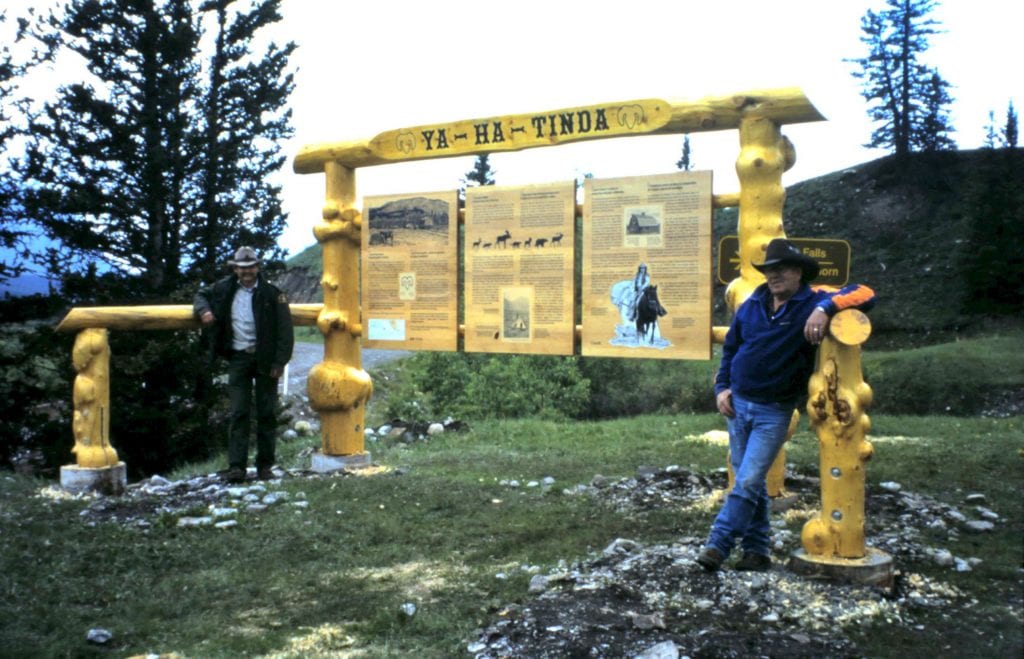
Frank Burstrom and John Nylund in front of the Ya Ha Tinda sign, created by Frank.
MH: Any other stories?
FB: Throughout this interview there are stories.
MH: Do you ever miss being a Warden?
FB: There are times when you get itchy feet and want to saddle up and leave again. Those parts I miss but the office stuff…not at all. I hated computers, still do. I remember the first computer I saw in Lake Louise in 1981 or 1982. They had a computer set up in the main office and we weren’t allowed to touch it, we might break it. Can’t ride it, can’t eat it what good is it. I remember being in the Banff office and getting an email from the guy on the other side of the divider. I said, “Why didn’t you just stand up and say something? You just wasted your time and mine”.
Cheryl Penny was the Superintendent in Grasslands and I’d set up Poverty Ridge, a remote Warden Station over there and she’d say, “I haven’t seen any emails from you.” I said, “Cheryl, I don’t do emails. I look at them every couple weeks or so.” “How do I get ahold of you, you have to read your emails.” I told her all the emails start out in French and I figured out how to do page delete. She said, “There’s English further down, it’s important”. I said, “Not if it starts out in French”. She said ’How do I get ahold of you if you don’t answer emails?” I said, “You could phone me and I’ll answer every time.” She never sent me another email over the next few years. She would always phone, we’d discuss what we needed to on the phone and carry on. We lack communication if we are using email. Just a waste of time.
MH: Do you have any photos of yourself as a warden that you would like to donate? Artifacts? 4510:
FB: I never really got into picture taking. I have no pictures of myself that I’m aware of. It’s kind of like, when I wanted to see it, I’d go back.
MH: What year did you retire? 4540:
FB: I don’t remember, it’s a blur. 2016.
MH: What do you enjoy doing in retirement? 4600:
FB: A good part of my career was made up of two jobs. Warden Service for six months and then as a carpenter/restoration guy for the other six. Travelling around to different National Parks and Historic Sites doing restoration work is a lot of fun and that stuff needs to be done. So I’m retired but I still do that kind of work. Basically working at Skoki for the last little while and there are a couple of other places coming up that need some major work as well. I don’t ride in; my hips won’t take the saddle anymore. That’s one of the reasons I retired. I might get 10 minutes in the saddle before excruciating pain so I’ve left the riding part of it behind. My hips need to be redone.
MH: Is there anything I haven’t asked you that you think I should know about the Warden Service? 4720:
FB: Not off the top of my head.
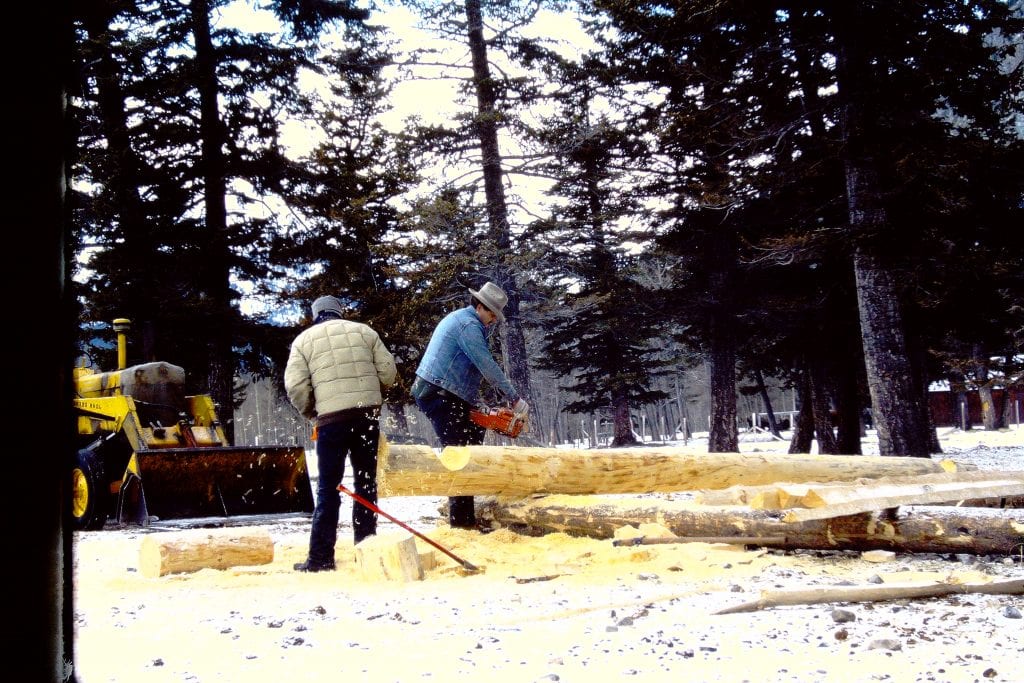
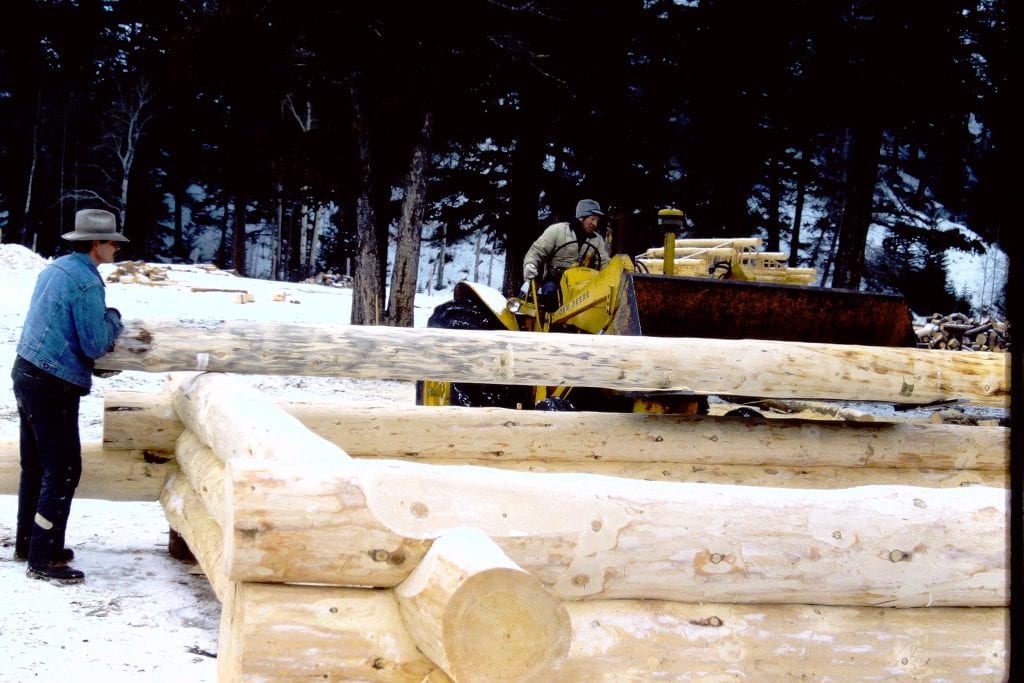
Frank and Johnny Building a Non-Hobbit cabin!
MH: Anyone else to interview?
FB: Gordie McClain. (Gordon McClain was interviewed in Phase 3) He was a Warden in Jasper for quite a number of years and then he went out to Pacific Rim when the Park first started and I worked with him there. He was a really good head. I think he’s around Nanaimo somewhere now. If you need to do an interview, do a drive out there! Guys like Mac Elder, Bob Haney, you’ve likely done. Did you get something from Keith Everts before he passed? Maybe Madeline Everts could be interviewed. I really enjoyed working with Keith. There were times we fought but there were times that we were the best of friends. It was always entertaining. We always disagreed on cabin sizes. Johnny Nylund and I had built two cabins 18X18 and that was for Palliser and that was Keith’s size. We build another one which ended up at Fish Lakes, 18X20 and we didn’t ask Keith about changing the size, we just did it. It didn’t make sense to have a square; everything in a cabin is on the wall. Then Keith decided they should be smaller and so that’s where Johnston Creek size came in. We’d argue about it to the point where it was somewhat uncomfortable. And he was avoiding me, and I was kind of avoiding him. I was working in the backcountry and stopped over at Johnston Creek and Keith didn’t know I was there and he came over from Mystic, so we ended up at Johnston Creek at the same time and had to make the best of it. I remember he was sitting on the bunk and had his feet up on the table and he said, “Yup pretty nice cabin eh?” I look at him and I said, “Yeah not bad if you’re a hobbit!” Well the war started again! I enjoyed working with him.
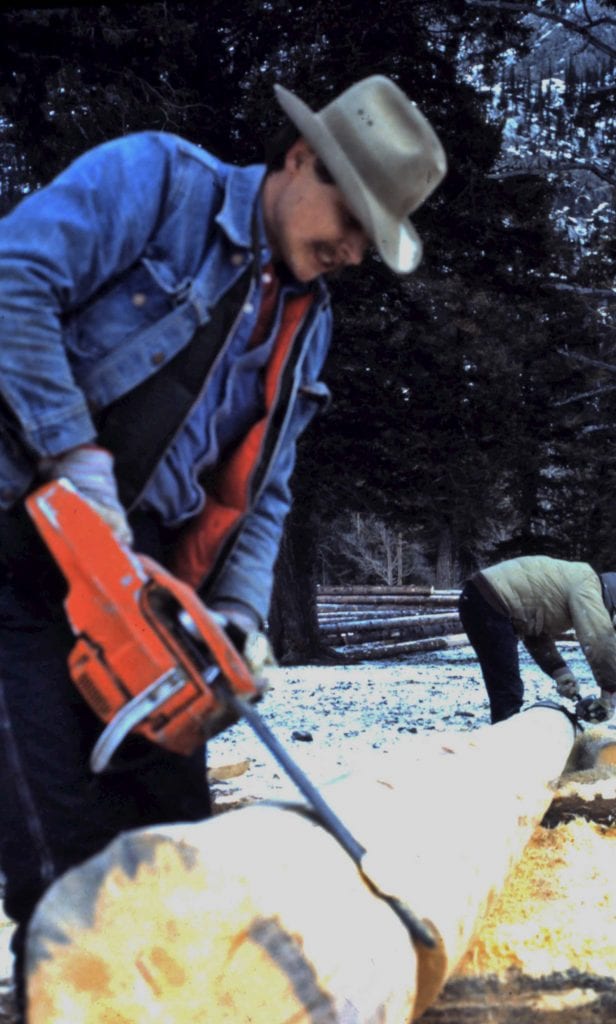
Frank perfecting a notch.
Bill Browne, Bad Billy is another one to be interviewed. He used to get into so much trouble that guy and I used to get him out of trouble. One time he was chasing after a young lady working for Ron Warner out at Stoney Creek Camp and we’d closed the road down by then, couldn’t drive across the bridge so he took the truck and went through the Cascade River and partied it up at Ron’s camp and coming back at night, he missed the crossing a little bit and hung the truck up on a big rock in the middle of the river. Water’s running through the floor boards so he’s stuck. He doesn’t want to get everything all wet so he takes all his clothes off, holds them over his head and starts walking towards shore. He slips and falls and all his clothes go down the Cascade River so now he’s hiking out to Lake Minnewanka, scrounges around until he finds a dime, gives me a call at home and I can tell he’s cold, his teeth are chattering. And he says, “You gotta help me. You gotta help me.” And I says, “Billy, what’s the matter?” “Well, can you bring me some clothes, I’m at Lake Minnewanka.” I told him to tuck back into the trees and I’d be there as soon as I can. So I grab some clothes and drove up and he comes scooting out and gets into the truck. There’s a lot of people around, it’s nighttime, it’s colder than hell, below freezing, he has no boots or clothes. He’d hiked barefoot so anyway, he tells me the truck is stuck on the Cascade River so we go down and get the 4X4 and go up there and sure enough, there’s the truck stuck in the middle. It’s drowned. I said, “Well, you got it stuck, take the cable” and we winched it out, get it out and of course it won’t start or anything so I hook onto it, he drives it, steering behind me and we take it back to the Warden Office. I recommended we take it over to the garage because it’s not going to start and he says, “No No no, nobody must know. We’ll put it in the parking lot. So we unhook it in the parking lot, push it into a parking stall in front of the Warden Office, go in, hang up the keys like nothing ever happened. Next day one of the guys goes to use the truck, opens the door and there’s water running out. Truck won’t start, it gets hauled over to the garage and it was totally drowned. It didn’t rain either. Bad Billy. That must have been a long cold walk! 4-5 miles.
MH: Any final comments?
FB: No can’t think of anything else.
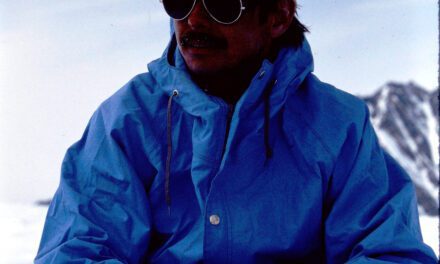
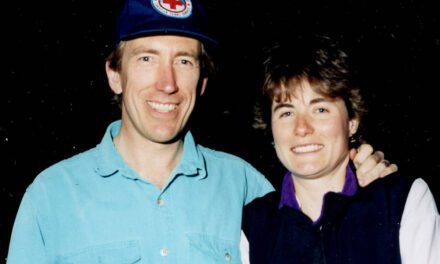
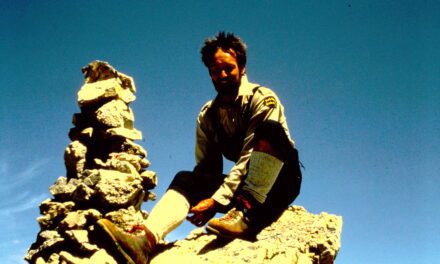
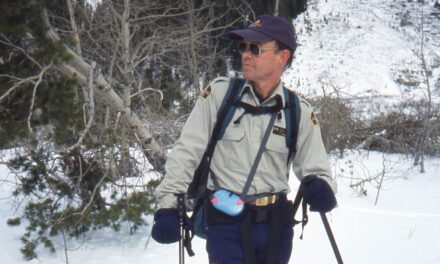
Always fascinating reading about these amazing guys and their history in the Parks!
Thanks for sharing!
Dan